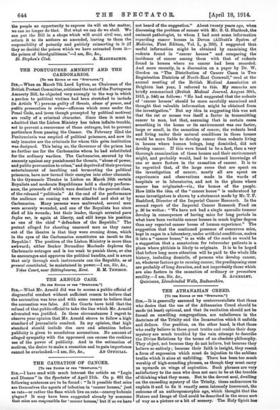THE CAUSATION OF CANCER.
[To ells Runes or re. "Sraervrov.."] have read with much interest the article on "Logic and Disease" in the Spectator of April 11th. On p. 601 the following sentences are to be found : " Is it possible that mice are themselves the agents of infection in 'cancer houses,' just as rats—or rather the fleas which live on rats—convey bubonic plague? It may have been suggested already by someone that mice are responsible for ' comer houses,' but if so we have
not heard of the suggestion." About twenty years ago, when discussing the problem of cancer with Mr. S. G. Shattock, the eminent pathologist, to whom I had sent some information regarding cancer houses in Devon (Allbutt's System of Medicine, First Edition, Vol. L, p. 209), I suggested that useful information might be obtained by examining the rodents found in "cancer houses " and comparing the incidence of cancer among them with that of rodents found in houses where no cancer had been recorded. And more recently, in a discussion on a paper by Dr. W. Gordon on "The Distribution of Cancer Cases in Two Registration Districts of North-East Cornwall," read at the annual meeting of the British Medical Association at Brighton last year, I referred to this. My remarks are briefly summarized (British Medical Journal, August 30th, 1913, p. 546) as follows " He had suggested that the rodents of ' cancer houses' should be more carefully examined and thought that valuable information might be obtained from the investigation." But my idea in suggesting this was not that the rat or mouse was itself a factor in transmitting cancer to man, but that, assuming that in certain cases something in the house or its environment was one factor, large or small, in the causation of cancer, the rodents bred and living under their natural conditions in those houses would be more liable to develop cancer than rodents living in houses where human beings, long domiciled, did not develop cancer. If this were found to be a fact, then a very thorough examination of these houses and their environment might, and probably would, lead to increased knowledge of one or more factors in the causation of cancer. It is to be regretted that, of the large sums that are spent on the investigation of cancer, nearly all are spent on experiments and observations made in the wards of hospitals or in laboratories, and not in the places where cancer has originated—viz., the homes of the people. How little the idea of the "cancer house" is understood by some investigators is shown by a statement made by Mr. T. F. Bashford, Director of the Imperial Cancer Research. In the second report of the Imperial Cancer Research Fund on p. 36 he writes " We have not had a single sporadic tumour develop in consequence of having mice for long periods in what have been veritable cancer houses in much higher degree than any reported cancer house of human experience." The suggestion that the continued presence of cancerous mice, kept in cages in a laboratory, under artificial conditions, makes it into a " cancer house," is as wide of the mark as would be a suggestion that a sanatorium for tubercular patients is a place where phthisie is likely to originate. It is to be hoped that before long more attention will be paid to the whole life history, including domicile, of persons who develop cancer, as, whatever factors go to causing cancer, the predisposing ones are probably of long duration, and not improbably those which are also factors in the causation of ordinary or premature










































 Previous page
Previous page